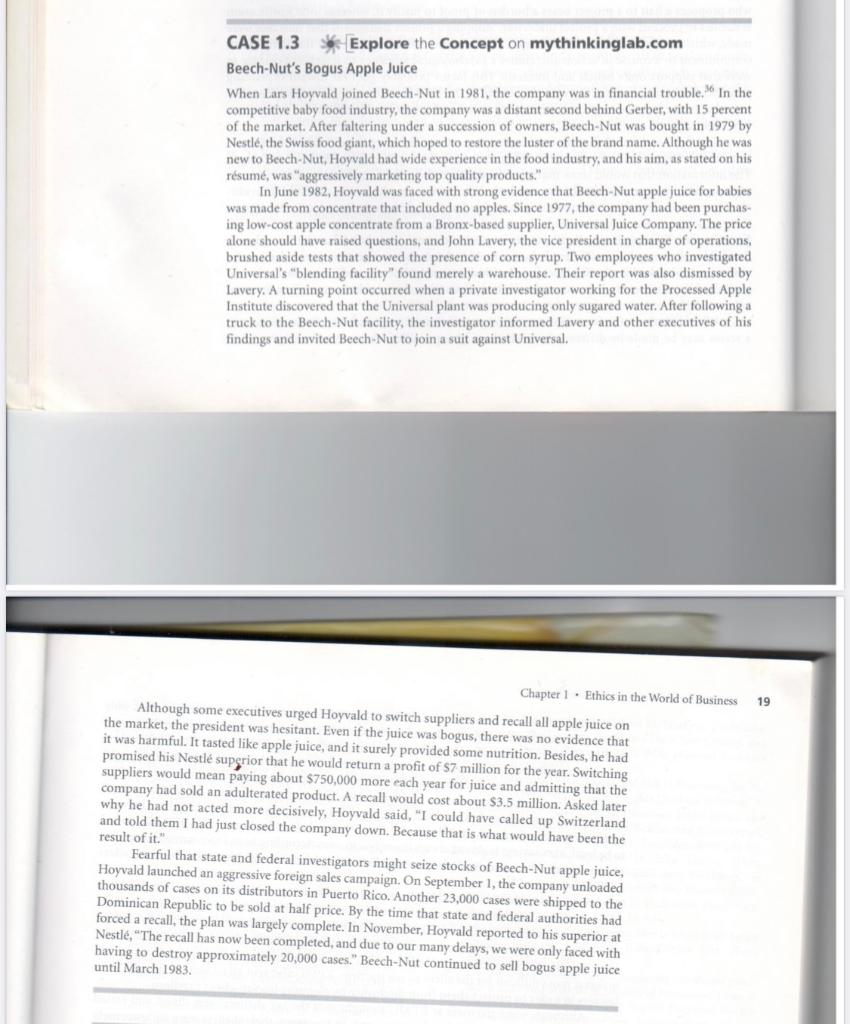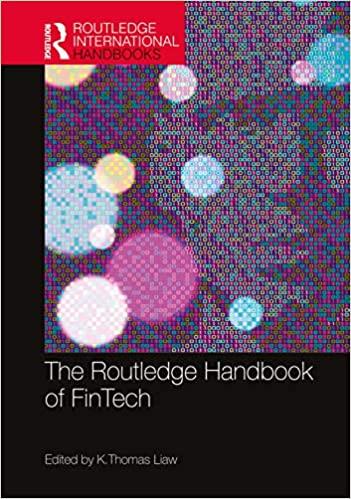
- Identify two different and opposite ethical approaches to Beech Nut's apple juice problem
- What are the two ethical systems that explain these approaches?
- Identify several (at least 3) stakeholders in the Beech Nut case.
- You are the CEO of Beechnut--make a decision about what to do, and justify it using an ethical concept
CASE 1.3 Explore the concept on mythinkinglab.com Beech-Nut's Bogus Apple Juice When Lars Hoyvald joined Beech-Nut in 1981, the company was in financial trouble. In the competitive baby food industry, the company was a distant second behind Gerber, with 15 percent of the market. After faltering under a succession of owners, Beech-Nut was bought in 1979 by Nestle, the Swiss food giant, which hoped to restore the luster of the brand name. Although he was new to Beech-Nut, Hoyvald had wide experience in the food industry, and his aim, as stated on his rsum, was "aggressively marketing top quality p In June 1982, Hoyvald was faced with strong evidence that Beech-Nut apple juice for babies was made from concentrate that included no apples . Since 1977, the company had been purchas- ing low-cost apple concentrate from a Bronx-based supplier, Universal Juice Company. The price alone should have questions, and John Lavery, the vice president in charge of operations, brushed aside tests that showed the of corn syrup. Two employees who investigated Universal's "blending facility" found merely a warehouse. Their report was also dismissed by Lavery. A turning point occurred when a private investigator working for the Processed Apple Institute discovered that the Universal plant was producing only sugared water. After following a truck to the Beech-Nut facility, the investigator informed Lavery and other executives of his findings and invited Beech-Nut to join a suit against Universal. raised presence 19 Chapter 1. Ethics in the World of Business Although some executives urged Hoyvald to switch suppliers and recall all apple juice on the market, the president was hesitant. Even if the juice was bogus, there was no evidence that it was harmful. It tasted like apple juice, and it surely provided some nutrition. Besides, he had promised his Nestl superior that he would return a profit of S7 million for the year. Switching suppliers would mean paying about $750,000 more each year for juice and admitting that the company had sold an adulterated product. A recall would cost about $3.5 million. Asked later why he had not acted more decisively, Hoyvald said, "I could have called up Switzerland and told them I had just closed the company down. Because that is what would have been the Fearful that state and federal investigators might seize stocks of Beech-Nut apple juice, Hoyvald launched an aggressive foreign sales campaign. On September 1, the company unloaded thousands of cases on its distributors in Puerto Rico. Another 23,000 cases were shipped to the Dominican Republic to be sold at half price. By the time that state and federal authorities had forced a recall, the plan was largely complete. In November, Hoyvald reported to his superior at Nestl, "The recall has now been completed, and due to our many delays, we were only faced with having to destroy approximately 20,000 cases." Beech-Nut continued to sell bogus apple juice until March 1983 result of it." CASE 1.3 Explore the concept on mythinkinglab.com Beech-Nut's Bogus Apple Juice When Lars Hoyvald joined Beech-Nut in 1981, the company was in financial trouble. In the competitive baby food industry, the company was a distant second behind Gerber, with 15 percent of the market. After faltering under a succession of owners, Beech-Nut was bought in 1979 by Nestle, the Swiss food giant, which hoped to restore the luster of the brand name. Although he was new to Beech-Nut, Hoyvald had wide experience in the food industry, and his aim, as stated on his rsum, was "aggressively marketing top quality p In June 1982, Hoyvald was faced with strong evidence that Beech-Nut apple juice for babies was made from concentrate that included no apples . Since 1977, the company had been purchas- ing low-cost apple concentrate from a Bronx-based supplier, Universal Juice Company. The price alone should have questions, and John Lavery, the vice president in charge of operations, brushed aside tests that showed the of corn syrup. Two employees who investigated Universal's "blending facility" found merely a warehouse. Their report was also dismissed by Lavery. A turning point occurred when a private investigator working for the Processed Apple Institute discovered that the Universal plant was producing only sugared water. After following a truck to the Beech-Nut facility, the investigator informed Lavery and other executives of his findings and invited Beech-Nut to join a suit against Universal. raised presence 19 Chapter 1. Ethics in the World of Business Although some executives urged Hoyvald to switch suppliers and recall all apple juice on the market, the president was hesitant. Even if the juice was bogus, there was no evidence that it was harmful. It tasted like apple juice, and it surely provided some nutrition. Besides, he had promised his Nestl superior that he would return a profit of S7 million for the year. Switching suppliers would mean paying about $750,000 more each year for juice and admitting that the company had sold an adulterated product. A recall would cost about $3.5 million. Asked later why he had not acted more decisively, Hoyvald said, "I could have called up Switzerland and told them I had just closed the company down. Because that is what would have been the Fearful that state and federal investigators might seize stocks of Beech-Nut apple juice, Hoyvald launched an aggressive foreign sales campaign. On September 1, the company unloaded thousands of cases on its distributors in Puerto Rico. Another 23,000 cases were shipped to the Dominican Republic to be sold at half price. By the time that state and federal authorities had forced a recall, the plan was largely complete. In November, Hoyvald reported to his superior at Nestl, "The recall has now been completed, and due to our many delays, we were only faced with having to destroy approximately 20,000 cases." Beech-Nut continued to sell bogus apple juice until March 1983 result of it







